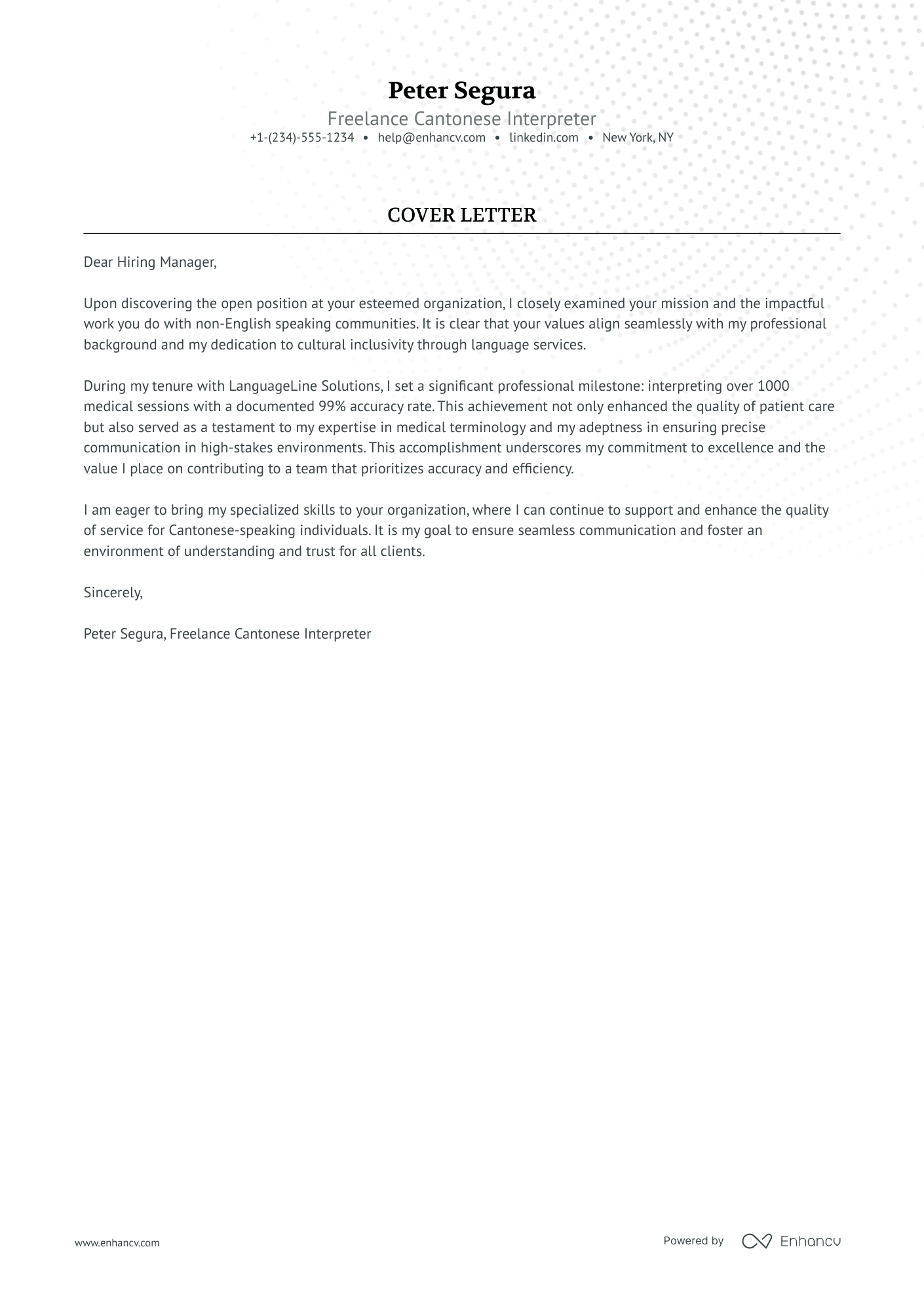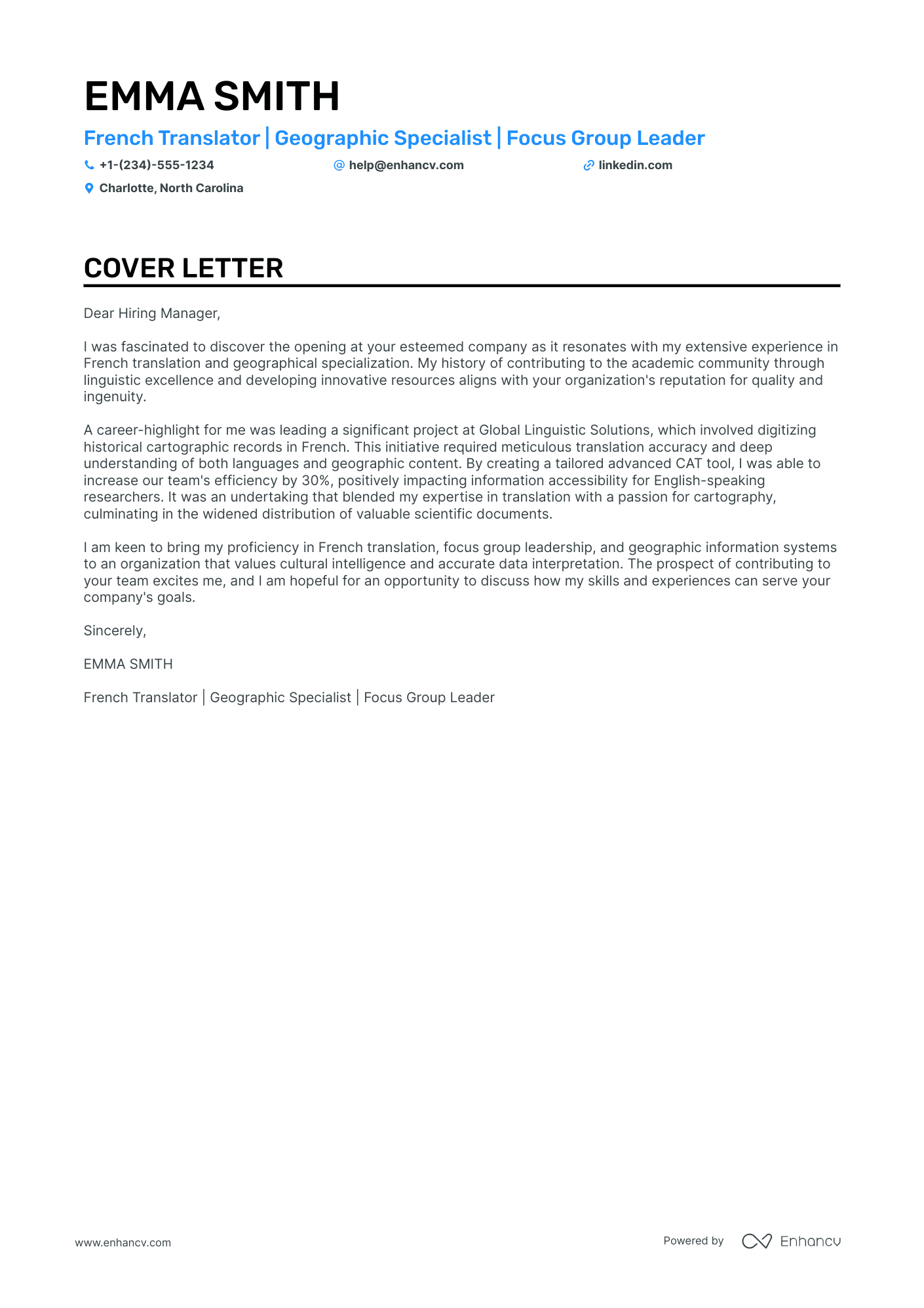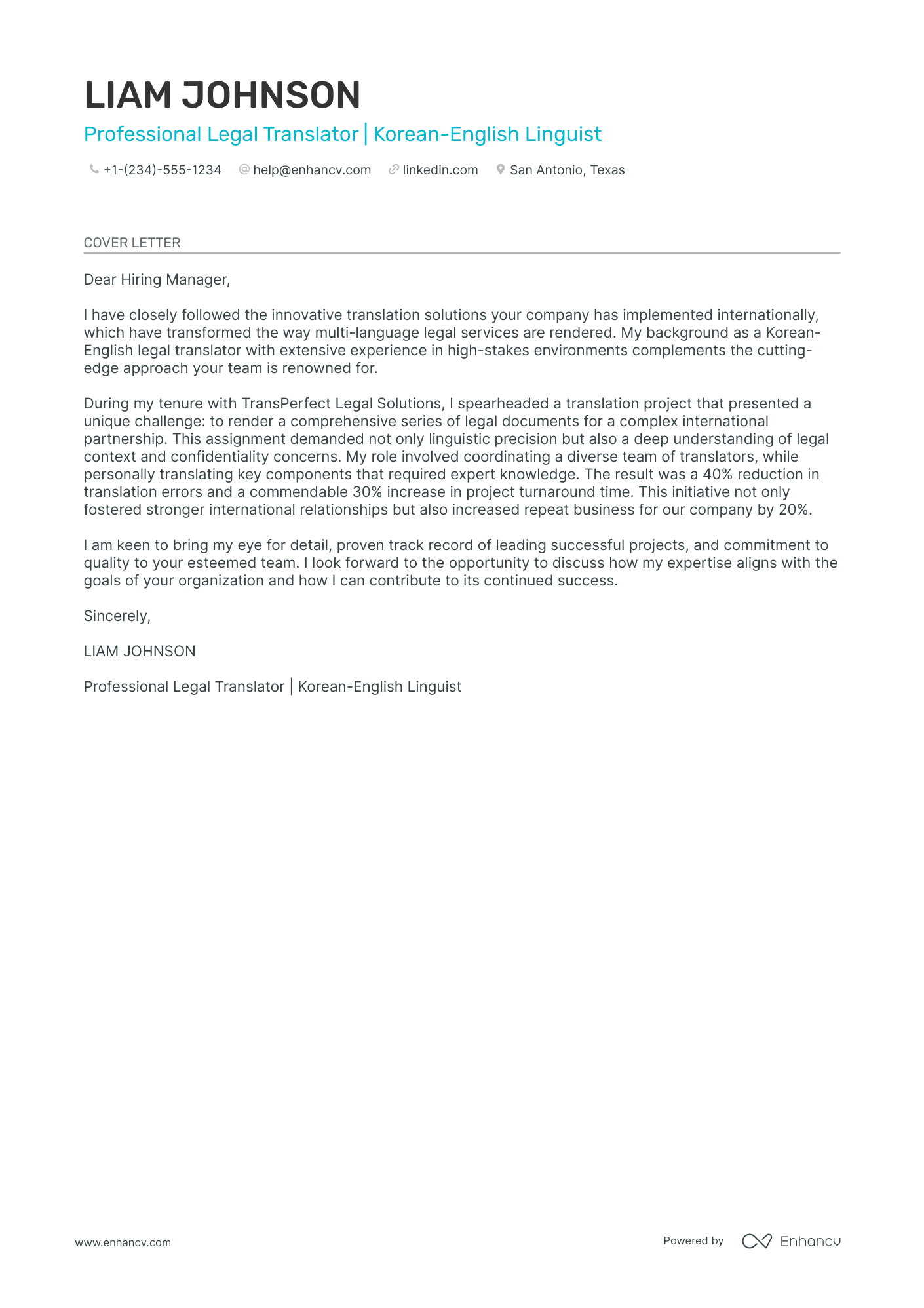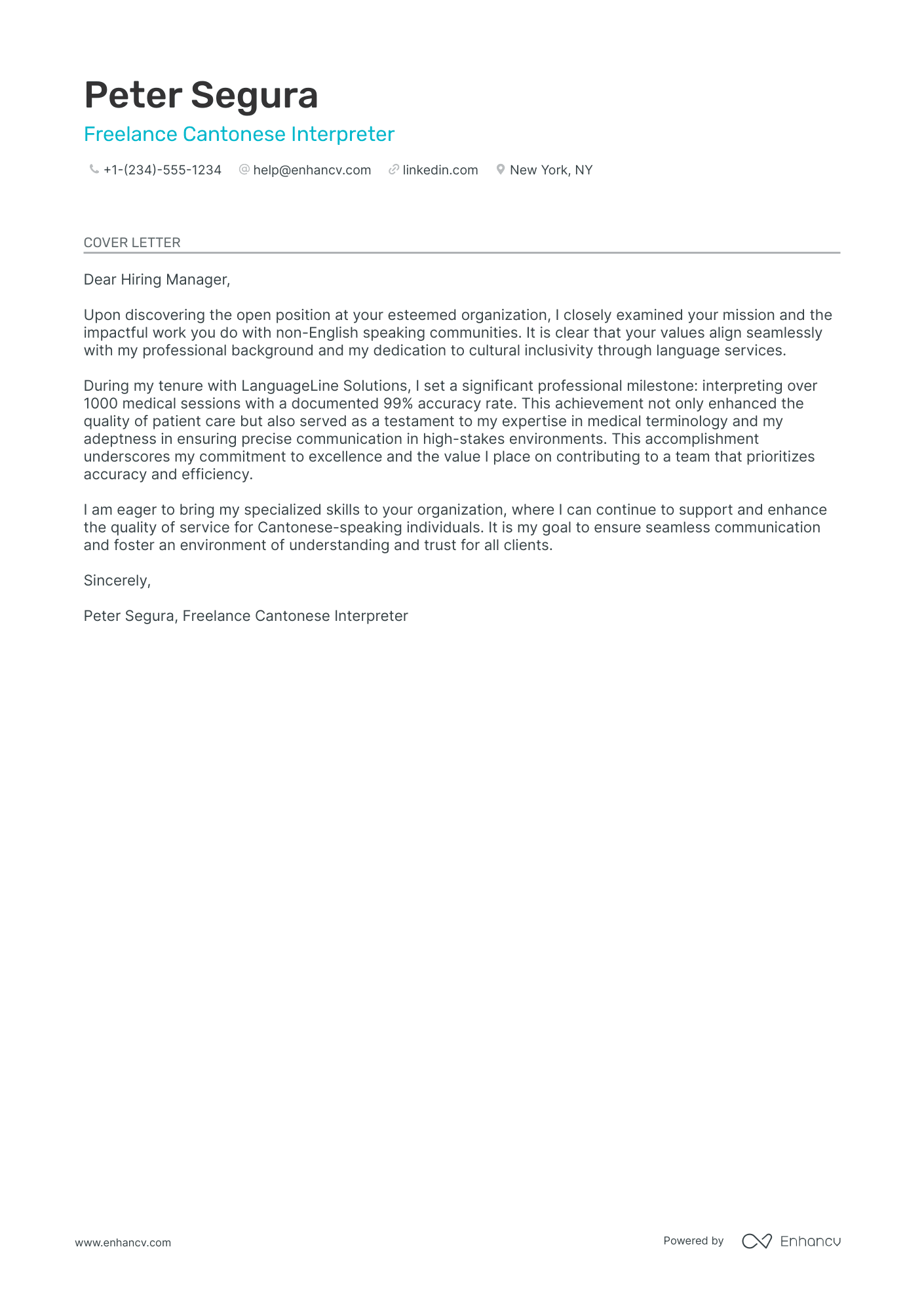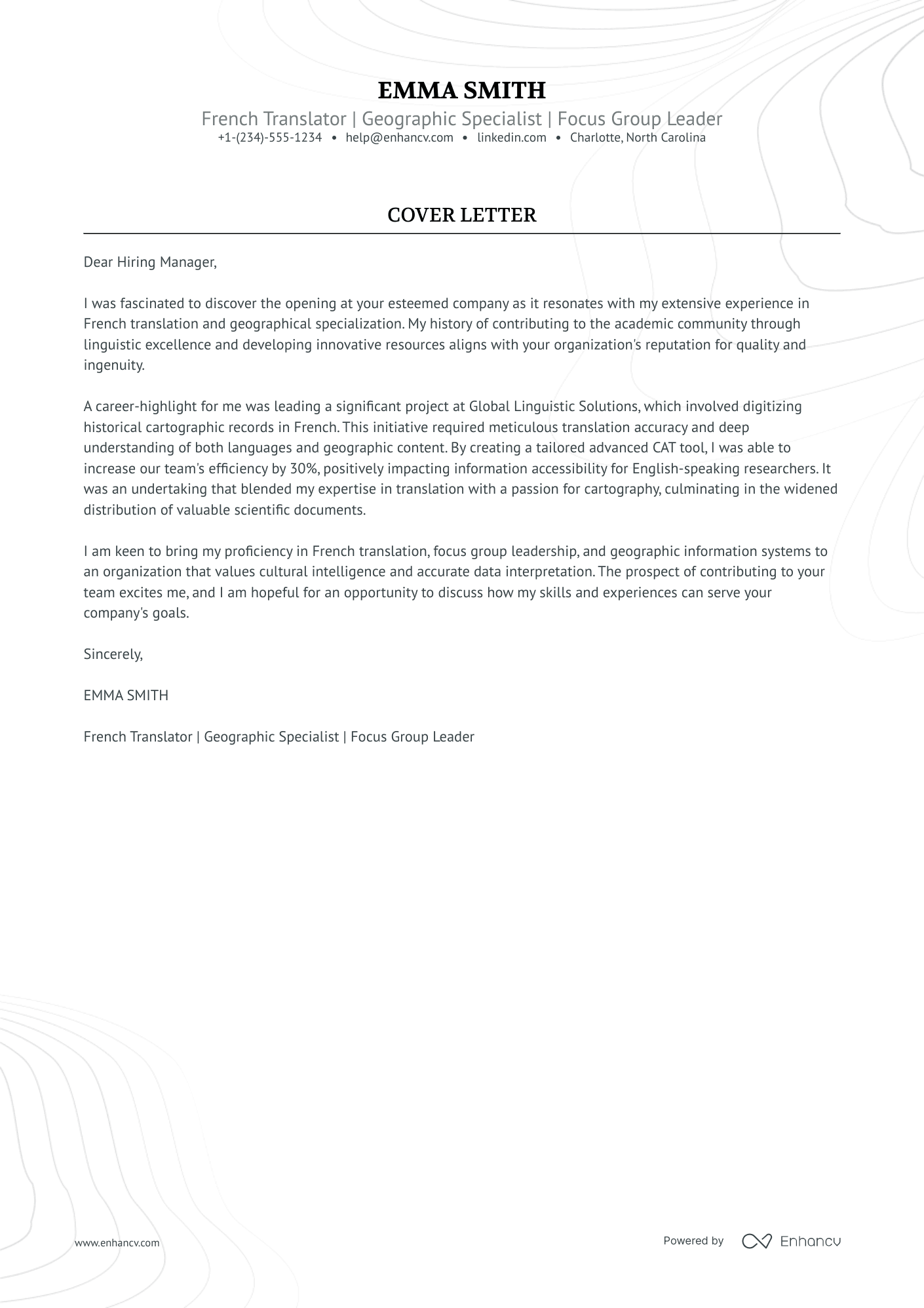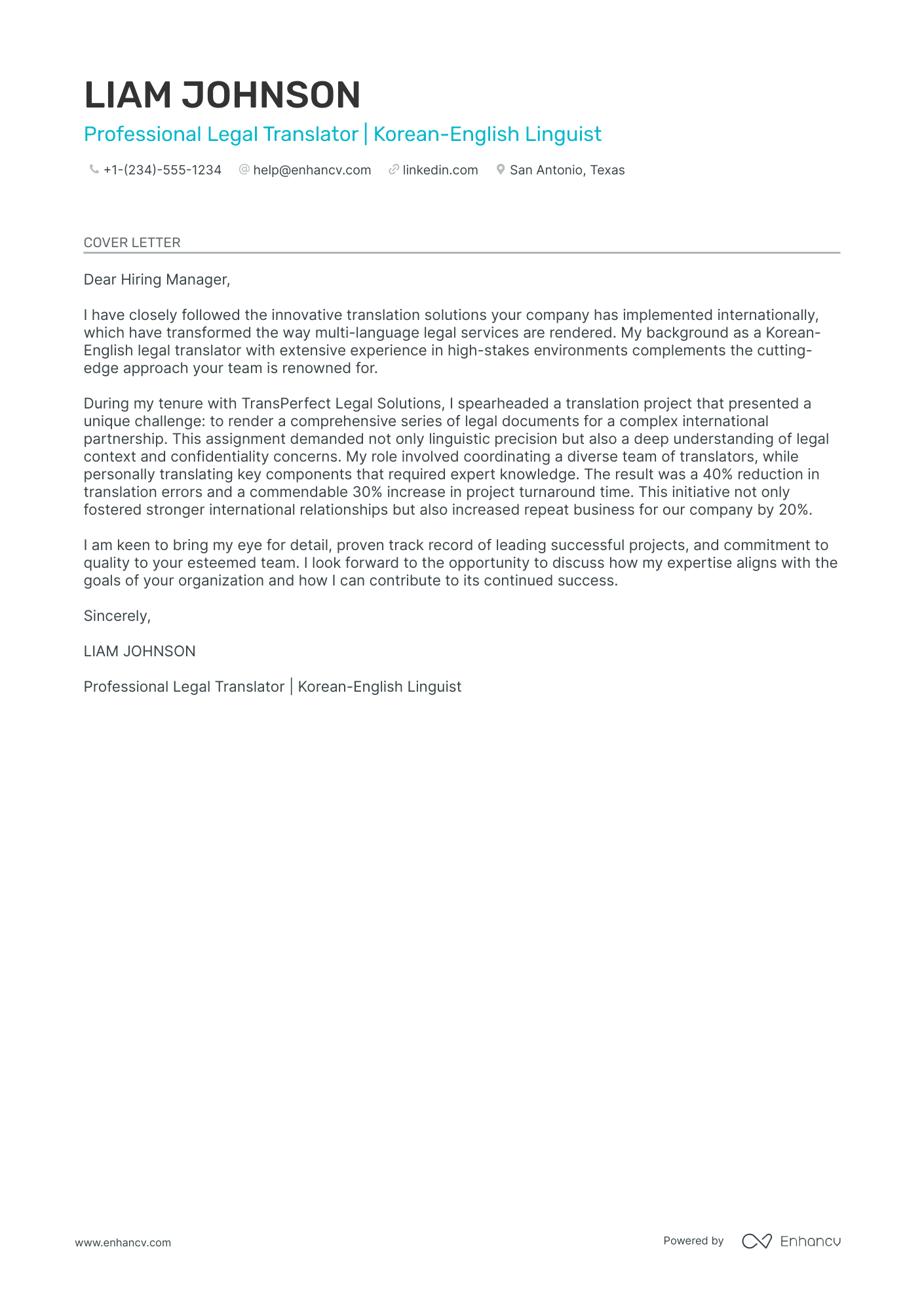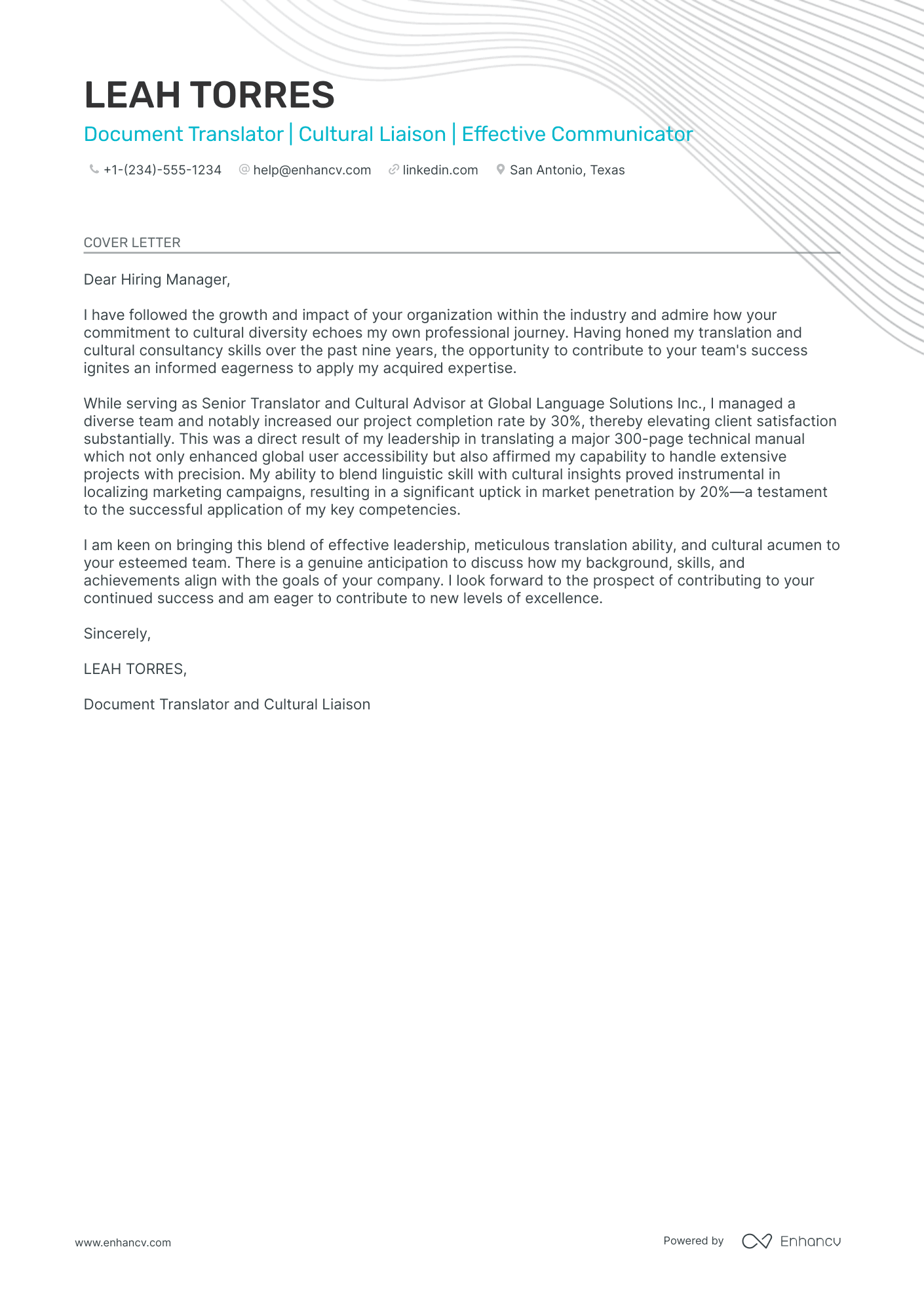Embarking on your job search, you've encountered the inevitable requirement of submitting a translator cover letter—a task that can be as daunting as it is crucial. Crafting a compelling letter isn't about echoing your resume; it's about weaving a narrative around your crowning professional achievement. Balancing formality with authenticity, your cover letter should captivate without succumbing to clichés, all within the concise span of a single page. Let's start shaping that standout story.
- Create a translator cover letter to persuade the recruiters you're the best candidate for the role;
- Use industry-leading translator cover letter templates and examples to save time;
- Dedicate your translator cover letter space to your best achievement;
- Make sure your translator cover letter meets recruiters' expectations and standards.
Avoid starting at the blank page for hours by using Enhancv's AI - just upload your resume and your translator cover letter will be ready for you to (tweak and) submit for your dream job.
If the translator isn't exactly the one you're looking for we have a plethora of cover letter examples for jobs like this one:
- Translator resume guide and example
- Tax Preparer cover letter example
- Real Estate Administrative Assistant cover letter example
- Dental Office Manager cover letter example
- Temporary Administrative Assistant cover letter example
- School Secretary cover letter example
- Medical Office Manager cover letter example
- Hotel Assistant Manager cover letter example
- Front Desk Manager cover letter example
- Administrative Secretary cover letter example
- Data Entry cover letter example
Translator cover letter example
KEVIN SMITH
Austin, TX
+1-(234)-555-1234
help@enhancv.com
- Emphasizing relevant professional experience, such as leading the translation of a complex technical manual, showcases the candidate’s proficiency with substantial technical content and leadership abilities, which are crucial for a senior role in translation.
- Highlighting the achievement of delivering a project ahead of schedule and its positive impact on revenue demonstrates the candidate's ability to meet tight deadlines and their contribution to business growth, signaling their potential value to the prospective employer.
- Expressing alignment with the organization's values and dedication to linguistic excellence and cultural relevance indicates the candidate's fit with the organizational culture and their understanding of the importance of these elements in translation work.
- Conveying eagerness to contribute to the team and mentioning the desire to discuss how their background, skills, and certifications align with the company’s objectives can pique the interest of the hiring manager to invite the candidate for an interview.
The visual appeal of your translator cover letter: format, font, and structure
When using our cover letter builder, make sure to include these vital sections:
- Header (with your name, contact details, the role, and date);
- Greeting (that's personalized to the recruiter);
- Introductory paragraph (to capture attention);
- Body paragraph (to tell a story of how you've obtained your job-crucial skills);
- Closing paragraph (ending with a nod to the future ahead);
- Signature (that is not a must).
Our cover letter templates are already set up for you with the best translator cover letter design with single-spaced paragraphs and a one-inch margin.
As for the font of your translator cover letter, use the same one as you did in your resume (where modern and simple fonts, like Rubik and Bitter, take precedence over Arial and Times New Roman).
Your translator cover letter is created with the recruiters in mind - as no Applicant Tracker System looks over this part of your profile.
When sending over your translator cover letter, download it in PDF. This format allows your information and design to stay intact and to keep the same visual quality.
The top sections on a translator cover letter
- Header: This includes your contact information, the date, and the employer's contact information, which is essential for the recruiter to know who you are and how to reach you.
- Greeting: Address the hiring manager or the recruitment team directly if possible; a personalized greeting shows that you've researched who will be reading your cover letter.
- Introduction: Briefly mention your enthusiasm for the language industry and how your background makes you a perfect fit for the translator position, setting the tone for the rest of the letter.
- Body: Delve into your translation experience, specific language skills, and any specialization in certain types of documents or fields (such as legal or medical translation), which demonstrates your competence and expertise.
- Closing: Summarize your qualifications succinctly, express your eagerness to contribute to the company's projects, and include a call to action, such as stating your availability for an interview or a follow-up.
Key qualities recruiters search for in a candidate’s cover letter
- Linguistic proficiency: Demonstrates fluent command of both the source and target languages, which is critical for accurate translation and maintaining the original content's integrity.
- Specialization in a specific field: Shows expertise in a particular subject area, such as legal, medical, or technical translations, providing the necessary vocabulary and understanding of the context.
- Cultural competency: Reflecting an understanding of cultural nuances and idioms, ensuring translations are culturally appropriate and convey the intended meanings accurately.
- Attention to detail: Essential for maintaining the precision and correctness required in translation, including grammar, punctuation, and stylistic nuances.
- Experience with CAT tools: Familiarity with Computer-Assisted Translation software aids efficiency and consistency, which is highly valued in the translation industry.
- Time management skills: Ability to handle tight deadlines and manage multiple projects simultaneously, which is often a requirement in fast-paced translation work.
How to start your translator cover letter: with a greeting, of course
Have you ever considered just how powerful a personalized salutation can be?
We sure have news for you! Your translator cover letter should start with the right salutation to recruiters, nurturing a sense of respect and individuality.
Greet recruiters by using their first name (e.g. "Dear Tom" or "Dear Patricia") if you've previously established contact with them.
Otherwise, opt out for the less familiar, "Dear Ms. Peaches" or "Dear Ms Kelsey", if you've found the recruiter's name on LinkedIn or a corporate website.
"To whom it may concern" is never a good option, as it creates a sense that you've been sending out your translator cover letter to anyone. Instead, use "Dear HR team" or "Dear (company name) recruiter" for a feeling of exclusivity.
List of salutations you can use
- Dear Hiring Manager,
- Dear [Specific Department] Team,
- Dear Mr./Ms. [Last Name],
- Dear [Company Name] Recruiter,
- Dear [Professional Title],
- Dear Recruitment Committee,
How to start your translator cover letter introduction
The opening paragraph of your translator cover letter can seem like a real enigma.
Where do you start writing?
In your translator cover letter introduction, focus on yourself by stating what:
- gets you motivated and excited about the role;
- you like best about the company, from culture to awards.
Write no more than two sentences, which are both authentic and show your enthusiasm for the opportunity.
That one achievement in your translator cover letter body
The lengthiest part of your translator cover letter is the body.
Within the next three to six middle paragraphs, present yourself as the best candidate for the role.
How can you do that without retelling your whole professional resume?
Select one key achievement that covers job-crucial skills and technologies (and is memorable).
Within the body of your translator cover letter, aim to tell the story of how you achieved your success. Also, write about how this would help out your potential team.
Thinking about the closing paragraph of your translator cover letter
Before your signature, you have extra space to close off your translator cover letter.
Use it to either make a promise or look to the future.
Remind recruiters how invaluable of a candidate you are by showing what you plan to achieve in the role.
Also, note your availability for a potential next meeting (in person or over the telephone).
By showing recruiters that you're thinking about the future, you'd come off as both interested in the opportunity and responsible.
What to write on your translator cover letter, when you have zero experience
The best advice for candidates, writing their translator cover letters with no experience, is this - be honest.
If you have no past professional roles in your portfolio, focus recruiters' attention on your strengths - like your unique, transferrable skill set (gained as a result of your whole life), backed up by one key achievement.
Or, maybe you dream big and have huge motivation to join the company. Use your translator cover letter to describe your career ambition - that one that keeps you up at night, dreaming about your future.
Finally, always ensure you've answered why employers should hire precisely you and how your skills would benefit their organization.
Key takeaways
Writing your translator cover letter has never been easier, so remember to:
- Select a translator cover letter template that automatically meets industry formatting (e.g. has one-inch margins, is single-spaced, is in PDF, etc.);
- Make your translator cover letter personal by mentioning the recruiters' first or last name;
- Within the introduction, describe what you like best about the company in no more than two sentences;
- Use your translator cover letter body to tell a story of your greatest achievement, backed up by job-relevant skills and technologies;
- If you have no professional experience, be honest about it in your translator cover letter, but also write about your unique talents.
Translator cover letter examples
Explore additional translator cover letter samples and guides and see what works for your level of experience or role.
By Role
